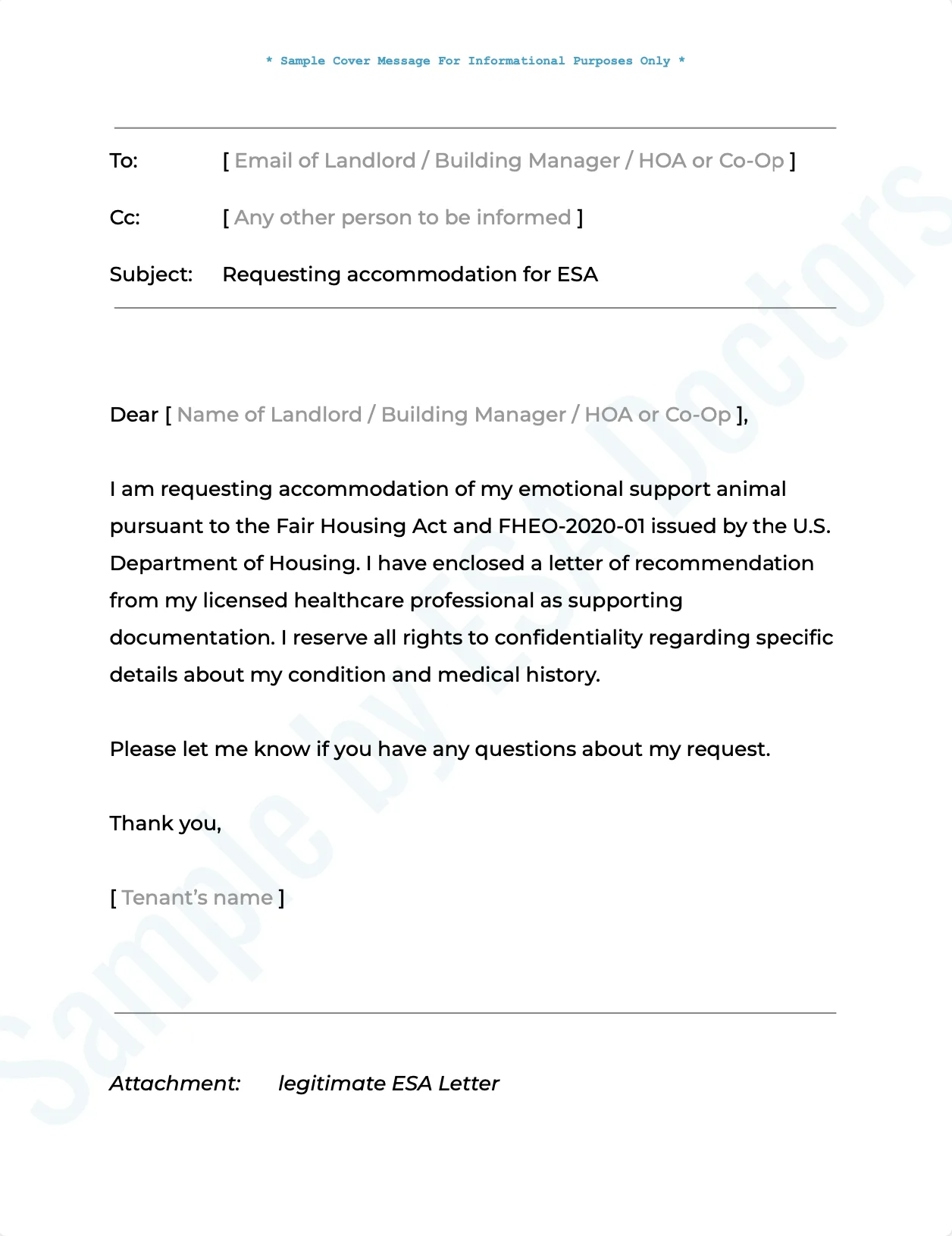You can inform your landlord you want to live with an emotional support animal by giving them an ESA letter. You do not need to submit any other forms, but you can include a simple cover message like the one below, if you wish. It can also help to have a brief conversation with your landlord before sending your documents.
Here are three steps for telling your landlord you have an ESA: 🏡
- Preview your ESA with a quick talk. If you’re comfortable talking to your landlord, it can help to have a quick discussion before sending your ESA letter. Your landlord may appreciate the heads-up and be more receptive to your ESA letter if they know it’s coming.
- Send your ESA letter via email. HUD advises tenants to keep a copy of their ESA request in case there’s a dispute later. Communicating by email ensures a digital trail is showing when you sent your request.
- If you want, include a cover message. If you wish, you can send your ESA letter with a brief cover note in your email. Below is an example of a cover message you can include.
Many new ESA owners are understandably anxious to inform their landlords about their emotional support animal. Especially if they live in a building that doesn’t allow pets or have signed a lease stipulating no pets. But keep in mind that the Fair Housing Act is on your side — you have a legal right to have your emotional support animal!
When requesting accommodation for your ESA, be friendly but firm. If you have a valid ESA letter, you can proceed confidently, knowing you’re backed by housing laws. Most ESA owners who are nervous about sending an ESA letter find the process easier than expected.
That’s because most landlords are more than happy to accept emotional support animals, especially when the tenant has done the right thing and included a legitimate ESA letter with their request.

Frequently Asked Questions About Informing Your Landlord About Your Emotional Support Animal
When should I tell my landlord about my ESA?
The timing of when to tell your landlord about your ESA can be tricky, but we recommend informing your landlord as soon as possible. While you do not have to disclose your ESA while signing your lease, we think it’s a good idea so they don’t feel blindsided later and you remain on good terms with them.
You’re allowed to disclose your ESA at any time — before you move in, after you sign your lease, after you adopt your ESA, etc., but as soon as you have your ESA letter, you should give your landlord a heads up. Remember, with an ESA letter, the law is on your side! Don’t be afraid to ask for something that is your right to have.
What documents should I have ready before telling my landlord about my ESA?
The most important thing to have when informing your landlord about your ESA is an ESA letter you can trust will work. To qualify for an ESA letter, you must have a condition like depression, anxiety, or PTSD that affects your ability to perform major life activities. It is up to a licensed healthcare professional to evaluate whether an emotional support animal can help you, and they are also the only ones legally allowed to write ESA letters.
If you want an ESA letter that you can confidently give to your landlord, ESA Doctors work with healthcare professionals who are licensed for your state and are pros at writing ESA letters. They’ll support your right to have an emotional support animal with a signed ESA letter just for you that contains their license and contact information in case your landlord wants to check their credentials.
Does my landlord have to accept my ESA letter?
Keep in mind that while most types of housing, including rental buildings, co-ops, and condos, have to accept ESAs, some smaller landlords are exempt. If you live in an owner-occupied building with no more than four units or a single-family home sold or rented by the owner without the use of an agent, your landlord does not have to accept your ESA letter. If you have one of these landlords, it doesn’t hurt to ask whether they’ll still allow your ESA as a courtesy.
Can my landlord insist that I use their special forms?
No, when informing your landlord about your ESA, all you need is your ESA letter. You can include a cover note if you want, but it’s not necessary. HUD’s housing rules made clear that landlords can’t request the use of their own forms.
Can my landlord deny my ESA?
Remember that there are valid circumstances when a landlord can deny your ESA. For example, if your landlord has evidence that your emotional support animal is dangerous or unsafe or has caused substantial property damage, Your landlord can also deny your ESA if your ESA letter is insufficient (for example, if it’s not signed by a properly licensed professional). That’s why it’s important to trust the source of your ESA letter.
How long should I wait for my landlord to respond?
Under HUD guidelines, landlords are expected to respond to a tenant’s ESA request within 10 days. After 10 days, your landlord should either approve your ESA or give you the reasons for denial in writing and allow you the opportunity to address their concerns. Landlords are expected to work with tenants in good faith when it comes to ESA accommodations.
Do I need to request a waiver of pet fees and deposits?
Once you’ve submitted your ESA documentation, you’re exempt from pet fees and deposits. There’s no extra step you need to take to get this benefit, but it can be a good idea to have your landlord confirm in writing that they will not be charging you a pet deposit or pet fee. If you previously paid a fee or deposit, you might be able to get a refund of your ESA fees.
See if you qualify for an emotional support animal below.
100% Money-back guarantee.






Our apartment complex has a pet policy that states a pet has to be over a year old and either spayed or neutered. My ESA is a 8 week old puppy who is getting vaccinated at each appropriate time, and I have the records. Can my landlords still deny him?
I have a service dog for my depression since 2016 and I also have my aquarium tank with fishes and we have a new manger. She called me 4 days ago saying I have to get ride of my aquarium tank because the weight and the amount of fish I have. But they help me with emotional support I also provided a doctor’s note that states that I been dealing with depression , stress and anxiety since 2015. Can they kick me out ?
I live in a mobile home park and I just gave the manager my ESA letter from my doctor. She then proceeded to tell me I needed to give her paper work to show my animal is registered. Can she do that?
You are not required ESA registration, but you may require the city animal registration.
I plan to get an ESA dog in January of 2019 – would my therapist and/or psychiatrist be able to provide a letter for the ESA before I even own the animal, or should I wait until I have the animal to request one?
You can have the assessment now so your therapist can begin evaluating you and determining whether an ESA may be helpful for your condition.
My landlord charged me a pet deposit for my esa and kept the $ even after I provided the proper paperwork. How do I write a request for the return of the pet deposit and the pet rent I was charged?
Landlords cannot charge pet deposits or additional pet rent for emotional support animals. You can request the deposit back via email or certified mail.
I live in a condo owned by an individual, but managed by HOA. I paid for the ESA letter and had to go out of town (with my dog). I just got back into town yesterday and received an email from the office that someone reported a dog in my unit. I am wondering what is the proper procedure in informing the landlord & the HOA? Should I send a joint email to both of them with the letter attached? I’ve lived here over a year & my lease is up in December, I am afraid they will find a reason to not renew my lease now. Any suggestions on how to handle this?
There are 2 other dogs in my building, but there is a no pet policy here (as explained to me in the email today).
Thanks
Hi there, my landlord is requesting a physical address of the therapist to be included in the letter. She has given her contact information and said he can follow up by contacting her via phone, but because she works from home she did not include an address. Does he have a right to ask for a physical address? He seems very adamant about it and that he will not accept the letter without this.
This is not required. In fact, the Fair Housing Act states “A housing provider also may not ask an applicant or tenant to provide access to medical records or medical providers or provide detailed or extensive information or documentation of a person’s physical or mental impairments.”
Been living in an apartment complex for a few months over a yr. They have known in writing i have a service dog (i know esa site) but new management is trying to get my doctor to write a specific worded letter that they want to provide. They r trying to kick me out due to not writing that specific letter ontop of the legal doctor letter they already have. They say its a requirement by there company that i have to get my doctor to write there letter there way. I have 3days to vacate now.
This is not required by law.
I live on a property with two houses, mine being one of the rentals. I already have my dog and am going to register her as an ESA. The problem is my landlord is planning on moving back to one of the homes at the end of October. I don’t go through a real estate company and rent directly from her. Will I have issues with giving her ESA paperwork since she will be living on the property?
So if i get your ESA letter and then my apartments want to talk to the Doctor that wrote the letter, what do i do?
The FHA prohibits landlords from requiring contact with your medical provider or asking for private medical information.